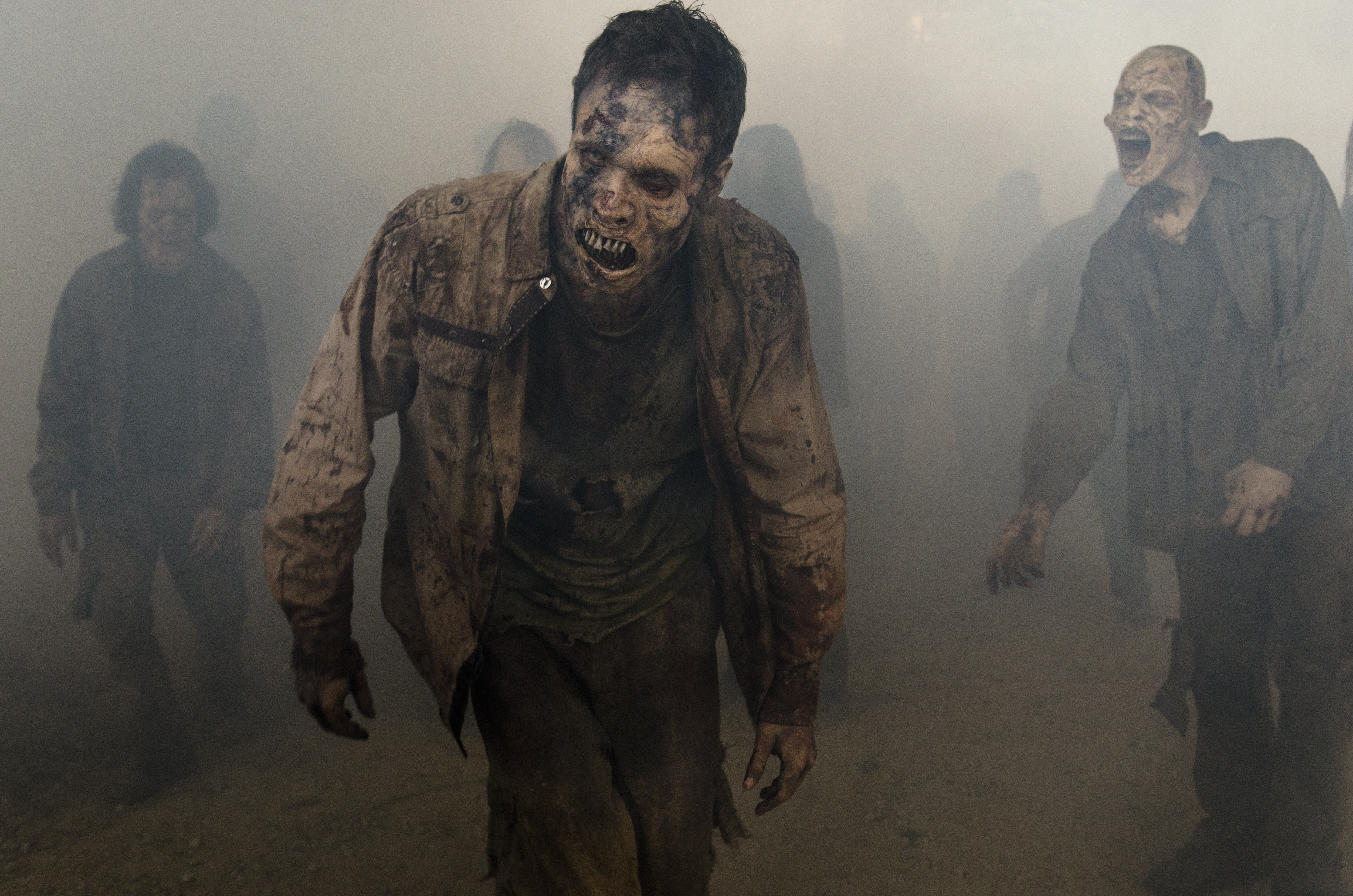Where The Walking Dead went wrong
America's favorite playfully gory horror Western has turned into a dire slog. What happened?


A free daily email with the biggest news stories of the day – and the best features from TheWeek.com
You are now subscribed
Your newsletter sign-up was successful
In the first and finest season of The Walking Dead, sheriff's deputy Rick Grimes (Andrew Lincoln) emerges from a coma to find the world he knows transformed into a grotesque zombie hellscape.
It's a familiar trope — Danny Boyle's 28 Days Later perfected it in 2002, with Cillian Murphy's chilling wander through abandoned London — but nonetheless a compelling one, tossing viewer and protagonist alike headlong into cataclysm. By the end of the series premiere, "Days Gone Bye," written and directed by creator Frank Darabont, the sense of the smallness of man against the sheer scope of a zombie disaster created The Walking Dead's most indelible image. Guns slung over his shoulder, cowboy hat high on his head, Rick rides on horseback into Atlanta, the highway's outbound lanes clogged with abandoned cars frozen in flight.
It was thrilling and beautiful. Indeed, the entire first season of The Walking Dead was pretty great.
The Week
Escape your echo chamber. Get the facts behind the news, plus analysis from multiple perspectives.

Sign up for The Week's Free Newsletters
From our morning news briefing to a weekly Good News Newsletter, get the best of The Week delivered directly to your inbox.
From our morning news briefing to a weekly Good News Newsletter, get the best of The Week delivered directly to your inbox.
Where did the show go wrong?
Entering its seventh season, which debuts this Sunday, AMC's adaptation of the popular comic has long since lost its flair for the genre's possibilities. What was once a playfully gory horror Western — Glenn (Steven Yeun) moaning and retching in the second episode, "Guts," as a group of survivors coat themselves in a protective layer of zombie innards — into a dire, dead-end confrontation with a series of cartoonish baddies. Still, the introduction of Negan (Jeffrey Dean Morgan) in the sixth season's atrocious finale was the logical culmination of seeds sowed in the first: Even then, The Walking Dead displayed a worrisome penchant for undermining its own best instincts.
In part, this is a consequence of the series' wild success. As The Walking Dead became a ratings smash, in particular among the coveted 18-49 demographic, AMC capitalized by expanding the second season to 13 episodes, and subsequent seasons to 16, stretching the narrative until it slowed to a halt — a soap opera with zombies, as I suggested in my recap of last season's "The Same Boat." (The problem shows no signs of abating: Aided by the surfeit of source material, the producers have reportedly mapped out The Walking Dead through Season 12.) There are only so many variations on the series' basic structure — search for a safe place, see it threatened by human frailties and hordes of walkers, move on — that one can deploy before the formulaic fundamentals triumph over the inventive details.
The problem, in essence, is that the series has doubled down on thin characterization and meandering narratives, rather than embrace its distinguishing feature, which is the potential to re-imagine the conventions of the zombie apocalypse as the survivors evolve over time. The transformation of Melissa McBride's Carol Peletier is the exception. Otherwise, The Walking Dead is stuck in the rut introduced in the first season's "Vatos": As an erstwhile "gangster" explains to Rick, relating his determination to protect the residents of the nursing home where he was a custodian, "The people we've encountered since things fell apart? The worst kind. Plunderers."
A free daily email with the biggest news stories of the day – and the best features from TheWeek.com
It makes sense, if you've read Thomas Hobbes, that the brutes would accrue power in the aftermath of a mysterious, civilization-destroying plague, but the extent to which The Walking Dead relies on this device to push the story forward is dispiriting. The Governor, the cannibals at Terminus, Negan: The series returns again and again to extraordinary human evils to distract from its inability to sustain our interest in the ordinary dilemmas of Rick's changing posse. (It hardly needs to be said that fidelity to the comics is no excuse for dull television.) When it comes to the emotional turmoil of those desperate to rebuild some semblance of society, The Walking Dead might pause for a corker episode or two — "The Same Boat" and "Twice as Far," for instance — but in the main it's too impatient with the niceties of character development to dramatize anything more subtle than the battle royale.
Confined to six episodes, the first season churns through action sequences and grotesque set pieces with enough haste to render the threadbare writing more or less moot, though certain subplots — such as the abrupt souring of Rick's friend, Shane (Jon Bernthal), into a sexual predator — presage the series' bluntness. As walkers set upon Rick's horse in a horrifying mass, or Glenn races out of Atlanta, alarm blaring, in a red sports car, the earliest episodes of The Walking Dead offer sharp, memorable images that cut against our expectations, or at least turn them to new ends. At its best, the series replicated the effect of Rick's approach to Atlanta, acknowledging the genre's conventions in order to see them with fresh eyes.
It's telling that the highlight of the first season is both a familiar feature of the zombie narrative — the search for a cure — and a surprising twist. Though Rick's goal of reaching the Centers for Disease Control is clear from the outset, the penultimate episode, "Wildfire," moves beyond his abstract hope that scientists are developing a treatment: With a precipitous cut to a video transmission, we meet CDC pathologist Dr. Edwin Jenner (Noah Emmerich), who reports that he's made "no clinical progress" in the 194 days since the discovery of the illness. Soon, in his fatigue, he accidentally destroys his one usable sample of walker tissue, and sinks into drunken despair. "I think tomorrow I'm gonna blow my brains out," he confesses, before the camera pulls back to reveal a cavernous, lonesome control room. "I haven't decided."
It's telling, too, that The Walking Dead can't resist the urge to make Jenner the villain. For decontamination purposes, the building is set to self-destruct once its last generator dies, and he welcomes Rick and his companions inside only to trap them there for the final incineration. Though Jenner is not nearly as sadistic as Negan, whispering sweet nothings to "Lucille" — his barbed club — before committing murder, the decision to treat the news that no cure is coming as insufficient to generate drama speaks to the series' central flaw, which is to distrust that the world it inhabits is already scary enough.
As Rick begs Jenner, ultimately convincing the doctor to allow their escape, all the living want is "a choice, a chance" to find a replacement for what's been lost. For The Walking Dead's audience, sadly, there's no such thing: There's only the now-predictable path toward one after another broad, flat antagonist, as if the error at the end of the series' formidable first season were doomed to be repeated forever.
Matt Brennan is a film and television critic whose writing has appeared in LA Weekly, Indiewire, Slant Magazine, The Week, Deadspin, Flavorwire, and Slate, among other publications. He lives in New Orleans and tweets about what he's watching @thefilmgoer.
-
 What to know before filing your own taxes for the first time
What to know before filing your own taxes for the first timethe explainer Tackle this financial milestone with confidence
-
 The biggest box office flops of the 21st century
The biggest box office flops of the 21st centuryin depth Unnecessary remakes and turgid, expensive CGI-fests highlight this list of these most notorious box-office losers
-
 What are the best investments for beginners?
What are the best investments for beginners?The Explainer Stocks and ETFs and bonds, oh my
-
 Walter Isaacson's 'Elon Musk' can 'scarcely contain its subject'
Walter Isaacson's 'Elon Musk' can 'scarcely contain its subject'The latest biography on the elusive tech mogul is causing a stir among critics
-
 Welcome to the new TheWeek.com!
Welcome to the new TheWeek.com!The Explainer Please allow us to reintroduce ourselves
-
 The Oscars finale was a heartless disaster
The Oscars finale was a heartless disasterThe Explainer A calculated attempt at emotional manipulation goes very wrong
-
 Most awkward awards show ever?
Most awkward awards show ever?The Explainer The best, worst, and most shocking moments from a chaotic Golden Globes
-
 The possible silver lining to the Warner Bros. deal
The possible silver lining to the Warner Bros. dealThe Explainer Could what's terrible for theaters be good for creators?
-
 Jeffrey Wright is the new 'narrator voice'
Jeffrey Wright is the new 'narrator voice'The Explainer Move over, Sam Elliott and Morgan Freeman
-
 This week's literary events are the biggest award shows of 2020
This week's literary events are the biggest award shows of 2020feature So long, Oscar. Hello, Booker.
-
 What She Dies Tomorrow can teach us about our unshakable obsession with mortality
What She Dies Tomorrow can teach us about our unshakable obsession with mortalityThe Explainer This film isn't about the pandemic. But it can help viewers confront their fears about death.
